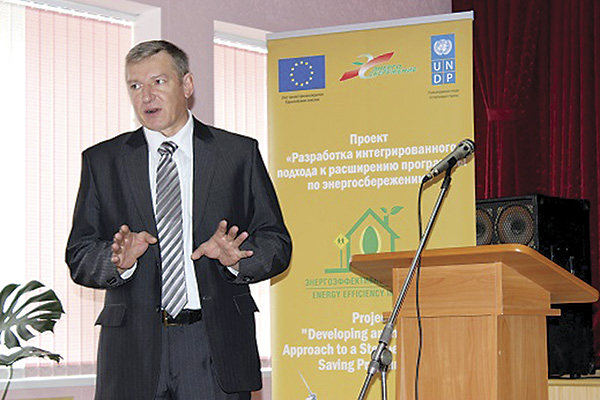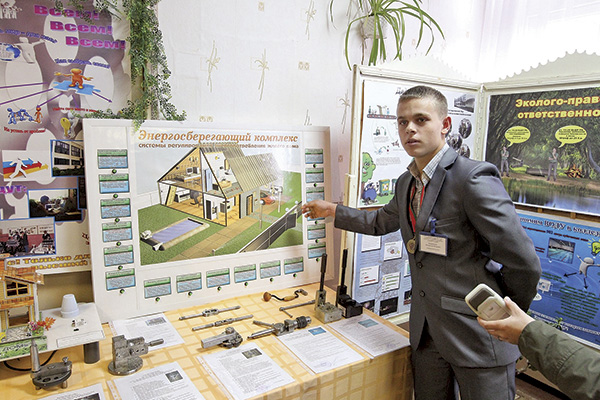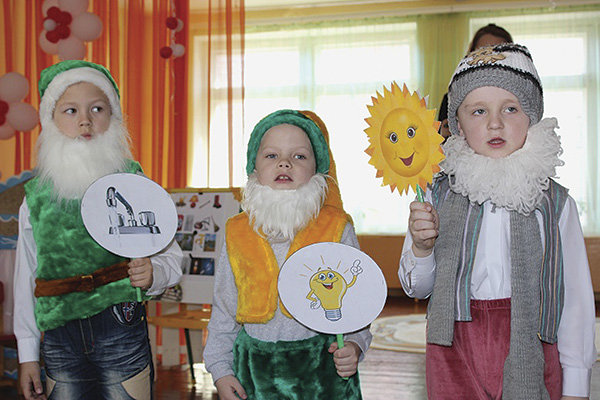 ♦ Preschool children in Oshmyany have been teaching the elderly ‘green’ habits, and have received not only applause and appreciation but requests to continue.
♦ Preschool children in Oshmyany have been teaching the elderly ‘green’ habits, and have received not only applause and appreciation but requests to continue. ♦ Kindergarten children in Grodno have been staging Kolobok shows in a new, energy efficient style, gathering full houses.
♦ Meanwhile, Vitebsk college students have launched an online site to promote energy saving, including an energy efficient rap. They’ve even installed reflective shields behind radiators, to make their classes warmer.
♦ Emergency energy races to rescue on all central channels and is already well recognizable to all citizens of Belarus
Various eco-projects are afoot across Belarus, thanks to the UNDP’s Developing an Integrated Approach to Expansion of Energy Saving (www.energybel.by). Financed by the European Union and the Energy Efficiency Department of the Belarusian State Committee for Standardisation, the programme is executing all such projects nationwide, headed by Sergey Nikitin. The aim of Energy Efficiency in Schools (as people are calling it) is to promote energy saving ideas via various events hosted by educational establishments.
Financing has been allocated to four educational establishments (chosen by tender). At the beginning of the project, energy audits were held at 27 educational establishments, across Minsk, Vitebsk and Grodno Regions, with the results used to plan energy efficiency in buildings. Relevant equipment was purchased and, later, a design initiative contest was organised. Four pilot sites were finally chosen: secondary school #4 (Dzerzhinsk), kindergarten #6 (Oshmyany), kindergarten #45 (Grodno) and Vitebsk’s State M. F. Shmyrev Professional-Technical College of Machine Building. Even those schools not chosen benefitted, since they gained an audit by specialists, and an action plan of recommendations for energy saving. Each school, kindergarten and college has ended up saving budgetary funds through energy saving.

Head of the Energy Efficiency project Sergey Nikitin
In addition, the project has taught teaching staff how to apply to participate in such contest run by the EU/UNDP. As a result, these establishments now hold all documents necessary for them to apply for modernisation. Recent events have included a round table discussion on how best to fund eco-projects and those related to energy efficiency.
At present, the four chosen educational establishments are modernizing buildings, adding insulation into walls and roofs, replacing windows (with those which are more energy efficient) and installing energy efficient lighting. According to Mr. Nikitin, new technologies are gaining in popularity in Belarus, such as solar panels to heat water, and heat recovery ventilation systems.
The project is certainly educational, involving the local population in rea-lizing energy efficient events and introducing training courses at educational establishments. These aim to change people’s daily habits, by applying simple measures to save energy in housing and in the production sector.
The project includes several training sessions for teachers, enabling them to cascade their knowledge and experience with colleagues. A methodical textbook is soon to be published, featuring chapters on energy efficiency, and schools will offer optional, extra classes.
Project initiators hope to promote energy efficiency via creativity, especially for school and kindergarten children, using cartoons, short films, comic strips and colouring books to demonstrate the advantages of renewable energy.

Students of Vitebsk Professional-Technical College of Machine Building demonstrate their own developments
The Energy Efficiency in Schools project is promoting a ‘green’ lifestyle via various events. Oshmyany preschool children have made friends with the local Electric Lines company, enabling the youngsters to learn about how electricity is generated. Moreover, they’ve shared their learning with the elderly and disabled at the local social services centre, attracting full houses for their unusual training sessions. The youngsters have used drama, dance, parody and fable to convey their message. Their audiences have been rapt. Oshmyany Electric Lines has now equipped the kindergarten with energy efficient lighting (provided by the project).
Grodno’s preschoolers have performed to disabled children. Their energy efficient remake of the popular Kolobok fairy tale, with help from the local branch of the Red Cross Society, received a diploma at the regional round of the 9th Republican Contest of Economic Projects: Energy Marathon-2015 (in the ‘cultural-spectacular event promoting efficient and rational use of energy resources’ nomination). The next task is professional filming of the performance, to feature in an educational film on energy efficiency training at preschool level.
We can solve not only educational but technical problems, as has been seen at the Vitebsk State M. F. Shmyrev Professional-Technical College of Machine Building. Students have installed reflective screens behind radiators in all college buildings, with guidance from project experts. According to Mr. Nikitin, Br7mln has been spent on materials and will pay for itself within just six months. “Heat losses will be cut by 3-4 percent while the average temperature will rise by one degree. We’ll annually save up to Br12mln,” he comments.
Knowledge and practical energy saving skills gained by students will find their way into many walks of life, thanks to the diversity of future alumni, who will be sure to implement modern technologies at their companies. Interestingly, the college team won the Energy Marathon-2014 contest for ‘the best educational establishment to create a system in the field of energy saving’. College lecturers created an Internet resource at http://energo.vgpl1.by/ (Forming the Future Jointly), providing original materials on energy saving and promoting ecological awareness.

Children’s matinee on the topic of energy efficiency in kindergarten #6 in Oshmyany
Another pilot project within the programme belongs to secondary school #4, in the city of Dzerzhinsk: a festival of pedagogical ideas called On the Path to Economy. It has invited other educational establishments in the city to take part, with an artistic approach welcomed. Senior grade pupils have made a video to present the results of a poll among parents on issues of efficient consumption of water, heat and electricity. Another video features the father of a pupil demonstrating solar panels on his house, and their rational use by the family.
The Energy Efficiency in Schools project has one more important component: territorial-oriented development to ensure sustainable management of energy resources. Project expert Valentina Stalygo explains that this allows close interaction with local community members, which is the best way forward.
“We’re used to the idea that someone else will provide funding,” says Mr. Nikitin. “Without financing, we tend to continue living under a broken roof, with thin, cold walls. Territorial-oriented development helps demonstrate initiatives to gain funding, and shows other possibilities.”
Importantly, the UNDP programme has created public-consultative councils within all pilot sites, encouraging involvement by local executive authorities and community members (teachers, parents, journalists and business representatives). They are now helping plan and monitor projects ‘from the bottom upwards’. The local community does not simply receive a ready product but must participate in its creation, establishing ownership. Various questions will appear during project realisation, with public-consultative councils being able to offer solutions, and thereby building their own experience.
By Vladimir Velikhov











